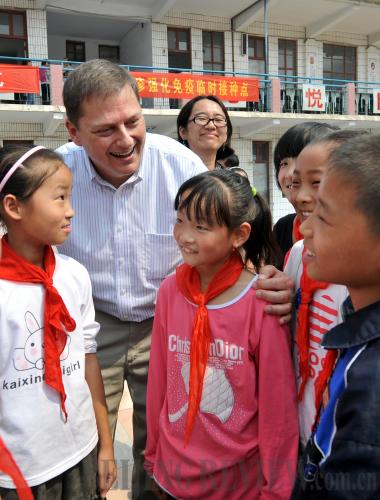|
 |
|
CARING ABOUT HEALTH: An official from the World Health Organization visits a primary school in Kaifeng County, Henan Province, on September 11, 2010, to investigate students' conditions, after receiving measles vaccines (WANG SONG) |
The World Health Organization (WHO) said China had complied with international standards for the regulation of vaccines after it completed the assessment procedures at the end of 2010.
China's national regulatory authorities, represented by the State Food and Drug Administration (SFDA), in the area of vaccines were recognized by WHO as functional, Lahouari Belgharbi, a scientist from the WHO Department of Immunization, Vaccines and Biologicals, told a conference in Beijing on March 1.
"Chinese manufacturers can now submit applications to have their vaccine pre-qualified by the WHO," he said.
Meanwhile, the WHO released a statement on its website, saying that this could eventually open the door for vaccines produced in China to be supplied through UN agencies to developing countries.
A significant step
In December last year, Belgharbi headed a group of WHO experts to conduct the latest assessment, examining the performance of SFDA with regard to vaccine regulation. It followed unsuccessful attempts by China to pass the WHO vaccine regulatory system assessment in 1999, 2001 and 2005.
The WHO experts specifically looked at seven fields of China's vaccine regulation system, including the overall regulatory framework, marketing authorization and licensing, post-marketing surveillance, especially the adverse reactions to immunization, lot release by the national regulatory authority, laboratory access, regulatory inspections of manufacturing sites and distribution channels, and authorization and monitoring of clinical trials.
They visited institutes involved in vaccine regulation in Beijing, Shanghai and Hebei and Jiangsu provinces.
The expert panel finally concluded that China's national regulatory authorities reached WHO's requirement. China became the 36th vaccine-producing country to have its regulatory system approved by the WHO.
The conclusion is the culmination of 19 months of intensive effort by the SFDA to implement a roadmap, developed by Chinese experts, with continuous advice from the WHO, to strengthen capacity for regulation of vaccines, the WHO statement says.
"Getting WHO approval this time shows our improved vaccine regulation efforts and guaranteed vaccine quality," said Shao Mingli, Commissioner of the SFDA.
"It is a validation of the capability of the Chinese regulatory authority," said WHO China Representative Michael O'Leary. With a regulatory system for vaccines documented to comply with international standards, vaccine manufacturers in China are now eligible to apply to the WHO for pre-qualification of vaccines.
WHO pre-qualification, which is a guarantee that a specific vaccine meets international standards of quality, safety and efficacy, is a prerequisite for manufacturers to supply to countries through UN procuring agencies, says the WHO statement. WHO independently evaluates each application for pre-qualification of a specific product.
It is expected specific vaccines from China could be approved in one to two years, according to the statement.
Vaccines are produced in only a small number of countries and often exported from the country of manufacture to many countries. Hence the eventual ability of UN procuring agencies to source vaccines from Chinese manufacturers is expected to have a significant, beneficial impact on the global supply of vaccines of assured quality, the statement says.
"China produces a large number of vaccines at affordable prices and could make a significant contribution to meeting the world's vaccine needs," said O'Leary.
According to SFDA statistics, China has 36 vaccine-producing plants manufacturing 49 kinds of vaccine for 27 different diseases. It has an annual capacity of nearly 1 billion doses.
"It is a chance for China to make a much more significant contribution to global world vaccine needs," Shao said.
Liu Peicheng, Director of the Media Relations at Sinovac Biotech Ltd., a Beijing-based biopharmaceutical company, believes the WHO's recognition will give a strong boost to China's vaccine producers.
"The approval will help raise people's confidence in China-made vaccines, which are, as the WHO recognizes, up to international standards," Liu told Xinhua News Agency.
He said it would help Chinese vaccine producers tap into the international market.
However, Gu Weijun, Secretary General of the China Pharmaceutical Association of Plant Engineering, said it will be a long time before Chinese vaccines enter the international market, due to weak management of vaccine manufacturers.
"It still needs four to five years for Chinese vaccines to make preparations," Gu told Beijing-based Century Weekly magazine.
| 